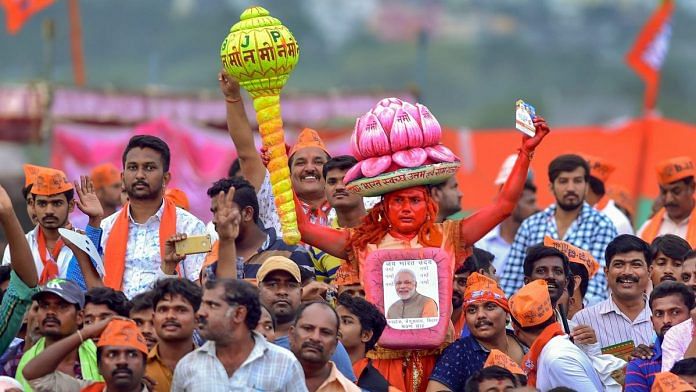From Modi and Shah to other party leaders, BJP has been silent on pet issues that it played up in the past, focusing instead on the Ram temple row.
New Delhi: Over the past few weeks, with electioneering on in full swing for five assembly states, the BJP poll campaign has been bereft of issues that the party has routinely played up in recent elections.
From Prime Minister Narendra Modi and party chief Amit Shah to the much-eulogised panna pramukhs (booth-level workers), the entire saffron unit has maintained a stoic silence on issues such as triple talaq, Uniform Civil Code, Article 370, the Goods and Services Tax (GST) and demonetisation.
Instead, the party has begun playing up an old core agenda that had been relegated to the backburner all these years — the construction of a Ram temple in Ayodhya.
While Sangh affiliates have gone on the offensive over the Ram temple issue, the BJP has been far more circumspect but has weaved it into its electoral narrative this time around.
On Monday, Shah said the BJP believes a grand Ram temple should be built in Ayodhya and accused the Congress of putting hurdles in its effort. He was addressing a rally at Indore in Madhya Pradesh.
A day earlier, Prime Minister Modi, addressing a rally at Alwar in Rajasthan, accused the Congress of dragging the Supreme Court into the politics over the Ram temple.
Also read: BJP’s two-pronged poll approach — Vikas in manifesto, Hindutva in campaigns
The relegated issues
The BJP had even mentioned in its manifesto for the Uttar Pradesh assembly elections in 2017, that it would find ways within the Constitutional framework to ensure a Ram temple is built in Ayodhya.
But the party did not focus on the temple row in that election, instead raking up triple talaq and the demand for a Uniform Civil Code.
It also emphasised on demonetisation, carried out in November 2016, to the point that it dubbed its sweeping victory in UP as a referendum on the Prime Minister’s decision.
In subsequent elections, the issue was raked up to destroy the opposition’s claim that demonetisation would strip BJP of its power as people had suffered due to it.
Another economic issue that the ruling party claimed as its masterstroke was the implementation of GST. The economic reform faced opposition, initially from even the BJP’s core vote-bank of traders but the many amendments to the Act appear to have reduced the opposition. The reform too was hailed during election speeches as one of the achievements by the party.
Neither issue, however, has made a prominent appearance in the current poll campaign.
Modi did mention demonetisation at a rally in Mandsaur, Madhya Pradesh, but that was to attack the Congress high command.
“Look at the shamelessness… mother and son are out on bail….They are asking me questions why I ban the notes?” he had said.
Sticking to local issues
The assembly polls in these five states — Madhya Pradesh, Chhattisgarh, Rajasthan, Telangana and Mizoram — are considered to be crucial for the BJP and are being seen as the semi-finals for the 2019 Lok Sabha polls.
Moreover, three of the states have incumbent BJP governments making it more important for the party to seek a win there ahead of the general elections.
With the stakes high, sources said the party had decided not to focus on ‘national’ issues in these elections and that the decision was taken at the highest level.
Instead, it was decided that the party would focus on development under the leadership of its chief ministers in three states and Prime Minister Narendra Modi, sources said.
“Congress is playing a dirty game of polarising Hindu votes into castes. Our focus is to consolidate the votes and attack Congress for its caste politics,” said a senior party leader.
Also read: A shrill, hardline Yogi Adityanath is just what BJP needs to promote Hindutva narrative






